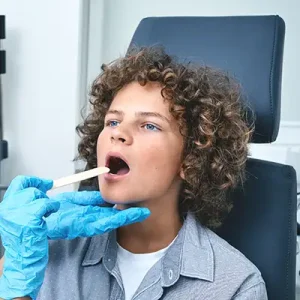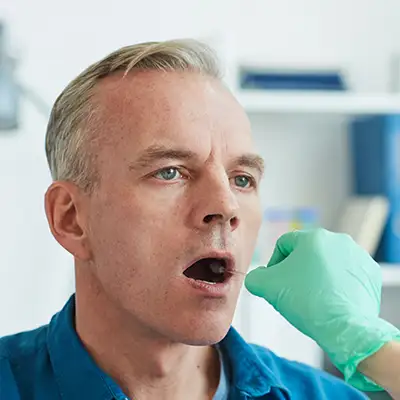Swallowing is something most of us do effortlessly. But for individuals with dysphagia, this seemingly simple act can become difficult, uncomfortable and even dangerous. Occasional difficulty swallowing isn’t a concern, but ongoing difficulty can be a serious medical condition and should be assessed.
Dysphagia, or difficulty swallowing, is a common yet often overlooked medical condition that affects the ability to move food or liquid from the mouth to the stomach. It can impact nutrition, hydration and quality of life. In some cases, it may pose serious health risks.
Swallowing disorders can be caused by a wide range of conditions, including neurological diseases, head and neck cancers, post-surgical changes and gastroesophageal reflux disease (GERD). In some cases, conditions like obstructive sleep apnoea may also be linked, particularly when there is associated structural or muscular dysfunction in the throat.
If left untreated, dysphagia can lead to aspiration pneumonia, malnutrition, dehydration and a significant decline in general health. Fortunately, with proper assessment and treatment through a multidisciplinary team, many people with dysphagia can regain safe and effective swallowing function.

Swallowing disorders can be categorised based on where the problem occurs during the swallowing process.

This type affects the mouth and throat. It often involves difficulty initiating a swallow or transferring food from the mouth to the oesophagus. Individuals may experience coughing, choking, nasal regurgitation or voice changes after swallowing.
It is a subset of oropharyngeal dysphagia, specifically referring to difficulty in the oral phase of swallowing when you chew food and move food within the mouth. This condition can result from issues such as tongue weakness, poor lip closure or reduced saliva production.
This occurs when food has trouble moving down the oesophagus into the stomach. People may feel as though food is getting stuck in their chest or throat.
Dysphagia may also be a symptom of broader medical issues such as neurological conditions (e.g. Parkinson’s disease, stroke), muscle weakness or inflammatory diseases like eosinophilic oesophagitis.
Each type of dysphagia requires different diagnostic and therapeutic approaches. A comprehensive evaluation by an Ear, Nose and Throat specialist, gastroenterologist and Speech-Language Pathologist is essential for accurate diagnosis and treatment planning.

The symptoms of dysphagia can vary depending on what causes difficulty in swallowing for you, and whether the issue is in the mouth, throat or oesophagus. Some people may only notice mild discomfort, while others may experience significant trouble swallowing.
Some patients also experience sleep disturbances, especially if dysphagia is associated with obstructive sleep apnoea or nocturnal reflux. When dysphagia is related to head and neck cancers, symptoms may progress gradually, often accompanied by a sore throat, hoarseness, ear pain or a neck mass
The causes of dysphagia may be due to various underlying health issues or known risk factors, including:

Treating dysphagia requires a multidisciplinary approach, often involving ENT specialists, speech language pathologists, dietitians, radiologists and sometimes gastroenterologists or neurologists, depending on the underlying cause. Speech pathologists also manage other communication disorders that may coexist with dysphagia in neurological conditions.
At Complete ENT, we work collaboratively across disciplines to ensure every patient receives an individualised care plan that addresses both the symptoms and root causes of their swallowing difficulties.
The swallowing disorders treatment planned for you will vary depending on the type, severity and cause of dysphagia. From swallowing therapy and dietary adjustments to medical management and surgical interventions, our goal is to restore safe, effective swallowing and support long-term health and quality of life.
Swallowing therapy is a cornerstone of dysphagia management and is typically led by a qualified speech pathologist. Therapy is personalised and designed to retrain and strengthen the muscles involved in swallowing. Common components of swallowing therapy may include:
Therapy sessions are often guided by findings from a video fluoroscopic swallow study (VFSS) or fibreoptic endoscopic evaluation of swallowing (FEES), which help tailor the intervention to the patient’s specific needs.
For many people with swallowing dysphagia, adjusting the texture and consistency of foods and drinks can significantly reduce the risk of aspiration (when food or liquid enters the airway). The dietary modifications to your eating habits may include:
In some cases, swallowing difficulties are linked to underlying medical conditions such as gastroesophageal reflux disease (GERD), oesophageal inflammation or muscle dysfunction. Medical management may include:
Medical treatment is often used in combination with therapy and dietary changes to address both symptoms and their root cause.
When swallowing is unsafe or severely impaired, enteral feeding may be necessary to maintain nutrition and hydration. Feeding tubes can be used on a short-term or long-term basis and may include:
Feeding tubes can prevent complications such as malnutrition, dehydration and aspiration pneumonia in patients who are unable to meet their nutritional needs by mouth. At Complete ENT, decisions around feeding support are made collaboratively with patients, families and the multidisciplinary team to ensure comfort, dignity and quality of life.
Surgery for dysphagia may be recommended when the swallowing disorder is caused by structural abnormalities or blockages that cannot be managed conservatively. Swallowing disorders surgery may include procedures such as:


When food, drink or saliva enters the airway instead of the oesophagus (known as aspiration), it can introduce bacteria into the lungs and lead to aspiration pneumonia. This condition is particularly dangerous in older adults and those with weakened immune systems, often requiring hospitalisation.
Repeated aspiration can result in recurrent chest infections, which may present as coughing, wheezing, or shortness of breath. Over time, this can lead to chronic lung damage or aspiration pneumonia, especially in vulnerable individuals.
People with dysphagia may avoid eating or drinking due to fear of choking or discomfort, which can result in inadequate nutrition and fluid intake. Over time, this can lead to weight loss, fatigue and weakened immunity, further compromising overall health.
Severe dysphagia can pose an immediate risk of choking, especially with solid foods or thin liquids. This can lead to medical emergencies requiring urgent intervention.
In rare but severe cases, repeated aspiration can trigger a life-threatening lung condition called acute respiratory distress syndrome (ARDS). ARDS involves significant fluid build-up in the lungs, making it extremely difficult to breathe and requiring intensive care.
If you’re experiencing ongoing or worsening swallowing problems, it’s important to seek specialist care. An ENT (Ear, Nose and Throat) is trained to evaluate the structures of the throat, voice box and oesophagus. A comprehensive swallowing evaluation using tools like FEES or VFSS helps identify the safest and most effective treatment path. Complete ENT’s team can identify both common and complex causes of dysphagia.
You should consider seeing an ENT if you experience:
At Complete ENT, we work in collaboration with speech pathologists, gastroenterologists and radiologists. Early diagnosis and treatment can help prevent complications and significantly improve your quality of life.


Call us on
07 3905 5999